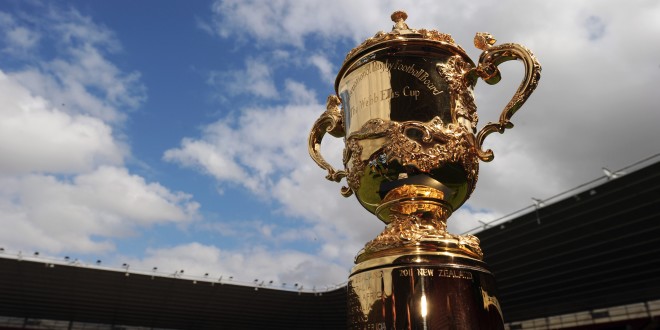Hosting a Rugby World Cup is something unions, supporters and players alike all dream of. For some the opportunity has already been realized. For others it is being mapped out as a futuristic goal. Argentina, Canada and the USA are all such instances. For 2023 none are bidding, with the tournament to instead either return to Europe or South Africa.
There are four options, three of whom have hosted in some capacity in the past. Historic voting behavior from World Rugby authorities suggests the past is a minor not a major factor. New Zealand winning more votes than Japan in 2005 to land Rugby World Cup 2011 is a case in point. Another is Wales winning sub hosing rights for both 2007 and 2015.
On the losing side of both these tournaments was South Africa. Africa’s rugby global powerhouse is back bidding again and is up against France, Ireland and Italy. All three are offering different tournaments and each, indeed, offer World Rugby with genuine opportunities.
France
2007 was less than a decade ago but come 2023 it will have been sixteen years. This is the identical time frame between 1999 and 2015, two different occasions in which England was involved in the hosting of Rugby World Cups. England also hosted in 1991.
Unlike the three tournaments involving England Rugby World Cup 2023 would be staged entirely in one country. France is looking to host the event by itself, as it ought to have done so in 2007. Due to the politics of World Rugby Council voting, France allocated Scotland and Wales with matches.
For 2023 the French are looking to utilize the state of the art facilities that hosted soccer’s Euro 2016 event. This means large stadiums spread throughout the country. It also means the use of venues used by both French rugby clubs and the French test side. Indeed, all ten Euro 2016 venues have seen elite level rugby being played.
The French know how to deliver. So much so that with the ten venues off limits to rugby last June the LNR moved the Top 14 Final abroad. Played in Barcelona, Spain a world record crowd of 99,124 saw Racing 92 defeat Toulon.
Of note is that World Rugby are reportedly not at ease over Japan hosting Rugby World Cup 2019. With it being the unknown it is said to fall into the New Zealand 2011 category of requiring a guaranteed huge return in the following tournament. Of the four bidders France wins hand down in this regard.
The option of France will be seriously considered on the very grounds of profitability. It would see England’s record-breaking commercial success eclipsed with new records established. This is not speculation either. Rather, it is based on the highly successful commercial model in place that has given rise to the Top 14 to be rugby’s leading competition.
Ireland
The IRFU are seeking a first ever Rugby World Cup Final on Irish soil. Ireland’s bid is the first that has been made but it would be a third Rugby World Cup in the country. Rugby World Cups 1991 and 1999 both featured matches on the Emerald Isle. Not only pool matches but Quarter Finals and even a Semi Final.
On the surface it may appear to be a similar option to that of New Zealand 2011. That being a small country in geographical and population terms. Some characteristics are undoubtedly common with accommodation outside of Dublin being a potentially huge headache for authorities. Others are not. The crucial difference between the two is stadiums.
No announcement has yet been made but the Irish press has been keen to identify the likely venues to be included in the bid. Initially what was being reported was that the rugby stadiums used by Leinster, Munster and Ulster in the Guinness Pro 12 were to be joined by six GAA venues. Now the Independent are suggesting it will be eight GAA stadiums.
GAA stadiums are what propel Ireland as an option far greater than what New Zealand 2011 ever was. Croke Park in Dublin is Ireland’s version of Twickenham or the Stade de France. It also has a history hosting rugby and being full for these matches.
The 82,300 capacity Croke Park will be joined by the 51,700 capacity Aviva Stadium to give Dublin two venues. A third is possible in the form of the smaller RDS Stadium which currently seats 18,500. Additional Irish venues range in capacity but, nonetheless, dwarf New Zealand 2011.
Italy
Four Rugby World Cups have been played in Europe but Italy is yet to host a match. The five other member unions of the Six Nations have all hosted previously, Wales doing so on a staggering four occasions. Italy 2023 thereby offers new ground.
A Rugby World Cup in Italy would continue with the tradition of Europe hosting the event every eight years. But it would see Central Europe hosting for the first time. The change would represent significant political gain for rugby. A soccer stronghold would host the event and also a country that does not speak English.
The geographical and social advantages of Italy also being so close to the remaining Six Nations members give the country a significant starting point. Consider that of the hundreds of thousands of people who attended Rugby World Cup matches at the Millennium Stadium in Wales in 2015 only 5% were from Cardiff. This very factor indicates that Italy would be a huge draw.
The Italians bid is not their first. Italy bid to host Rugby World Cups 2015 and 2019 but World Rugby recommended England and Japan instead. England won based on it having the highest economic potential while Japan was needed to repair Public Relations damage from 2011 going to a previous host and it being deemed ready for 2019.
Lessons from Italy’s bids for these two events have been learned. Unlike those two bids 2023 would see all matches played in Italy. The previous bids included the French city of Marseilles. For 2023 Italy has confirmed twelve venues and they make the bid a highly compelling option.
Rome is the only city to have multiple venues. The Stadio Olimpio is one of two and is to be supported by Milan, Bari and Naples to give Italy four mega venues. Multiple options therefore exist for key matches and there will be no shortage of accommodation for visitors.
Left out are the rugby cities of Parma and Treviso. Rather than utilizing the Guinness Pro 12 home grounds Italy is thinking big. Bologna, Florence, Genoa, Milan, Padua, Torino and Udine have been included from the north. The south has Bari, Naples and Palermo which gives Sicily a host city.
South Africa
Rugby World Cup 1995 hosts South Africa are the only option from outside of Europe. The country is bidding for the fourth consecutive tournament. It lost out in 2011, 2015 and 2019 and the chances of this repeating itself are very real indeed.
There is no denying South Africa’s charm as a host for 2023. The country has a proud history in rugby, winning the Rugby World Cup on two occasions. The country itself also has a complete list of possible venues. No announcement has been made regarding there prospective stadia though it is widely expected that the ten stadiums used for the 2010 FIFA World Cup would all feature.
South Africa’s FIFA 2010 venues are large and modern. They are both newer and bigger than those that exist in Ireland. They are not a lot older than France’s venues either. The Final would be staged at Johannesburg’s Soccer City which holds up to 84,490 people.
The two factors South Africa must overcome to win hosting rights are history and government. World Rugby must be convinced that 1995 was sufficiently long ago unlike 2007. It must also convince the authorities that the government opposition is a minor factor.
Earlier this year South Africa’s Sports Minister, Fikile Mbalula blocked South Africa from bidding to host Rugby World Cup 2023. Without unconditional government backing the tournament stands no chance of being played in a country. World Rugby is clear on this issue. France, Ireland and Italy all have government approval and backing.
Summary
At the present point in time the economic opportunities of the four options are unclear. Details will become known over the coming weeks and months but, for now, it is speculative. For this reason economic considerations have been left out of the following table.
| France | Italy | Ireland | South Africa | |
| Government Backing | Yes | Yes | Yes | No |
| Nation Wide | Yes | Yes | Yes | Yes |
| Variety of Big Cities | Yes | Yes | No | Yes |
| Sufficient Large Stadiums | Yes | Yes | Yes | Yes |
| Large-Scale Rugby Culture | Yes | No | Yes | Yes |
| First-Time Host | No | Yes | Yes | No |
| First-Time Solo Host | No | Yes | No | No |
| Strong Rugby Neighbors | Yes | Yes | Yes | No |
| Professional Rugby | Yes | Yes | Yes | Yes |
| Prior Semi Finalist or Winner | Yes | No | No | Yes |
The above table shows where the four of them stand upon entering their respective bids. When details of the four bids are made public additional analysis can de made. For the time being what is clear is that all four have genuine strengths and are entirely capable of hosting a highly successful Rugby World Cup. None of them, however, is a perfect bidder.
The following table compares the stadiums likely to be used by the respective unions. They are listed in terms of capacity from highest the lowest. A total of twelve venues has been listed for each. This is the number to have predominantly featured under the existing format. All venues are listed with their existing capacities as stated.
| France | Ireland | Italy | South Africa |
| Paris (81,338) | Dublin (82,300) | Milan (81,277) | Johannesburg (84,490) |
| Marseilles (67,500) | Tipperary (53,000) | Rome (72,698) | Cape Town (64,100) |
| Lyon (58,212) | Dublin (51,700) | Naples (60,240) | Durban (62,760) |
| Lille (50,186) | Castlebar (42,000) | Bari (58,248) | Johannesburg (55,686) |
| Paris (47,000) | Limerick (49,886) | Florence (47,290) | Pretoria (42,858) |
| Bordeaux (42,052) | Killarney (39,120) | Palermo (37,619) | Port Elizabeth (42,486) |
| St. Etienne (41,965) | Antrim (32,600) | Bologna (38,279) | Polokwane (41,733) |
| Lens (38,223) | Cork (32,550) | Genoa (36,599) | Nelspruit (40,929) |
| Nantes (37,473) | Galway (26,197) | Padua (32,420) | Bloemfontein (40,911) |
| Nice (35,624) | Limerick (25,630) | Rome (30,000) | Rustenburg (38,646) |
| Toulouse (33,150) | Belfast (18,196) | Torino (27,958) | East London (16,000) |
| Montpellier (32,900) | Dublin (16,500) | Udine (25,144) | Kimberley (11,000) |
- The two Paris venues are the Stade de France and Parc des Princes
- The three Dublin venues are Croke Park, Aviva Stadium and RDS Arena.
- The two Limerick venues are Gaelic Grounds and Thomond Park.
- The Two Rome venues are Stadio Olimpio and Stadio Flaminio.
- Johannesburg venues are Soccer City and Ellis Park.
 Americas Rugby News Rugby news from across the Americas!
Americas Rugby News Rugby news from across the Americas!




